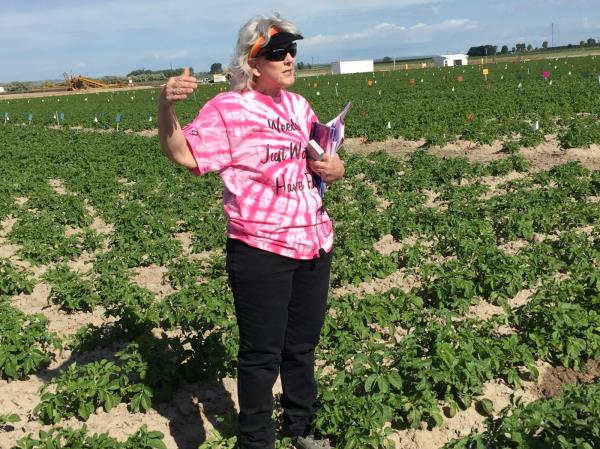Idaho farmers could face weedy growing season

ABERDEEN — Farmers throughout much of the state may be in for a weedy growing season, due to cold and rainy spring weather, a University of Idaho Extension weed expert said.
During the annual Snake River Weed Management Tour, hosted June 25 at UI's Aberdeen Research & Extension Center, weed scientist Pamela Hutchinson said growers could have an especially tough time controlling hairy nightshade.
Hutchinson believes heavy spring rainfall in many parts of the state likely pushed water-soluble herbicides, such as Matrix and metribuzin, a couple of inches deep into the soil profile, where they weren't accessible by weed roots but were taken up by potatoes.
Herbicides that aren't water-soluble, such as Sonalan and Prowl, remained higher in the soil profile, despite the heavy rain, but Hutchinson explained they're less effective against hairy nightshade.
From April through June 24, rainfall totaled 8.3 inches in Idaho Falls, 5.7 inches in Blackfoot, 2.6 inches in Aberdeen, 4.5 inches in Rupert and 6.4 inches in Boise.
Hutchinson said she anticipates receiving several calls from growers about weed concerns.
"I'm telling growers to keep an eye on weeds that might be coming now because they need to get Matrix and metribuzin on them now while they're really small," Hutchinson said, adding there's still plenty of time to make another herbicide application.
Hutchinson has already received several calls from growers about symptoms of damage in their spuds resulting from the uptake of water-soluble herbicides. Given the cold spring temperatures, spud crops were unable to adequately metabolize the herbicides, she added. But she said spuds should fully recover from any damage once the weather turns sunnier for a prolonged period.
"It's been rare for me to see (herbicide damage) go all the way to causing yield loss," Hutchinson said.
Aberdeen potato farmer Ritchey Toevs said his area didn't receive enough rainfall to result in significant herbicide damage to spuds. He's noticed more weeds than usual, nonetheless.
Toevs believes his weed problems are rather a result of cold weather slowing his crop progress compared with recent years, so his vines are behind their normal pace of forming a canopy to shade out competing weeds. Many of his spud plants also have crinkled leaves from recent frosts.
Hutchinson agrees potato crop progress is behind in Southeast and Eastern Idaho, which is likely exacerbating weed pressure.
She spoke with a grower in Parma who planted spuds on March 23. Usually, she said, farmers in the Aberdeen area plant a couple of weeks after Western Idaho. This year, however, growers in the Aberdeen area planted in late April or early May, she said. Cold and rainy weather has also stymied growth, she said.
"We're way behind," Hutchinson said. "Hopefully, it's sunny and everything can catch up, and we don't have an early frost in the fall."
Still can't find what you are looking for? Find by topic:
- Achievement Award (YF&R)
- Actions Alerts
- Advocacy
- Ag Ambassadors
- American Farm Bureau
- American Farm Bureau Policy Book
- Archive Photos
- Articles
- Board of Directors
- Calendar - State/District
- Calendar - County
- Capitol Reflections
- Collegiate Chapters
- Committee Application Form
- Commodities
- Convention Annual
- County Presidents & Board Information
- County Resource Page
- Delegate Form
- Discount Programs
- Discussion Meet
- Discussion Meet - High School
- Education Programs
- Events
- Excellence Award (YF&R)
- Expense Voucher
- Flickr
- Gem State Producer
- High School Discussion Meet
- High School Speech Contest
- Hope in Idaho Ag
- House of Delegates Credentials Form
- IFBF Board of Directors
- IFBF Policy Book
- IFBF Staff
- Insurance
- Legislative Action Program
- Legislative Issues
- Library
- MAC Trailer
- Magazines
- Map My Benefits
- Member Benefits
- Member Discount
- Membership Application
- Mission Statement
- Moving Agriculture to the Classroom
- Newsletter Sign up
- News Releases
- News Room
- Open Range Law
